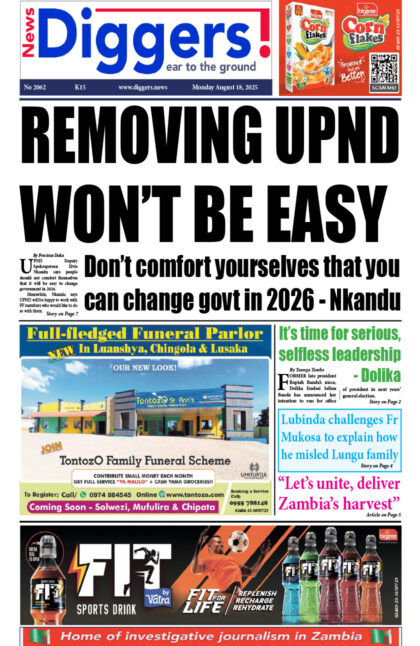Mines minister Richard Musukwa says operations at the Konkola Copper Mines (KCM) plant have been suspended until investigations into the sulphuric acid spillage are completed.
And Musukwa says 269 people, among them 232 pupils were affected by the toxic gas.
Rendering a ministerial statement to Parliament, Thursday, Musukwa said the plant would be recommissioned after all leakages were sealed and repairs completed.
“In order to avoid the reoccurrence of a similar incidence, my ministry has instituted the following intervention measures; operations at the plant have been suspended with immediate effect and plant units switched off until full investigations by all concerned stakeholders are complete and remedial measures are put in place. KCM has been instructed to provide a stable supply of power during the starting period on order to prevent the disruptions. KCM has been instructed to improve the convertor efficiency in order to reduce the time required for the stability operations during the plant starting period,” Musukwa said.
“The House may wish to know that the plant will be recommissioned after all leakages are sealed and repairs completed by mine safety inspectors and Zambia Environmental Management Agency (ZEMA). These measures have been taken in the interest of the safety of our people in and around the mining area in Chingola as well as the interest of environmental protection. Accidents in the process of mining are undesirable because they are a cost to both government and the company and indeed a negative impact on the environment. In this regard, government will ensure that mining companies subscribe to the most comprehensive and robust safety standards accepted globally. I wish to call for maximum adherence to safety standards and protocols by all mining houses. Government will continue propagation for pro activeness by the mines in a bid to avoid accidents and accidents which really can be avoided.”
And Musukwa gave an account of what led to the accident at the plant saying it was caused by a power surge.
“Mr Speaker, the gassing incident occurred on Thursday 14th November 2019 from 22:00 to 08:00 on Friday the following day. Mr Speaker, at the Sulphur burning plant of KCM’s Nchanga Smelter plant in Chingola, the incident occurred simultaneously. This incidence, Mr Speaker, was caused by a power surge. According to the preliminary investigations, the plant had undergone some repairs in the morning of 14th November 2019 on the Sulphur banner, the heat exchanger number two and part of the gas convertor with the intention of sealing the gas leaks which were noticed earlier on. After repairing the plant, it was then restarted however, before temperatures could be raised to reach the required operating conditions, there was a power surge which tripped the starter blower and resulted in the process disturbance before critical operating parameters had been initialized,” Musukwa explained.
“Mr Speaker, the power surge occurred at 18:25 and at 18:35, operations were restarted but the temperatures in the convertor had already dropped. This decreased temperature affected the convention rate for Sulphur dioxide to Sulphur trioxide thus resulted in the prolonged escape of sulphur dioxide gas through the stacks in the atmosphere. Mr Speaker, the escaped gasses descended to the ground level due to the high humidity affecting about 269 people in the area. Among them were 11 KCM employees, 52 KCM contractors, 232 pupils from Nchanga Trust School, 37 of whom were in Grade 12 and one member from the community. The affected people were rushed to the mine hospital and Nchanga Hospital where they were examined and their conditions confirmed stable by 16:00 hours on the 15th of November 2019.”
When Chifubu Member of Parliament Frank Ng’ambi asked if the affected Zambians would be compensated, Musukwa responded in the affirmative.
“It is not a question of KCM considering compensation, it is a case of KCM following the law consistent with the environment. All protection, once KCM investigation in this matter is completed, the law will take its course and ensure that KCM provides remedial actions both to the environment and people affected,” he responded.
Meanwhile, Mufulira Member of parliament Evans Chibanda asked what the cost implications were and how long the plant would be closed to which Musukwa said no cost implications superseded the safety of the environment.
“There will be some cost [implications] which will be [bared by] both by the company and the entities that depend directly or indirectly on KCM but there is no work, there is no cost, no value which is more important than the safety of our people and our environment. We are hoping that within two weeks, the plant should come back on stream,” said Musukwa.
























